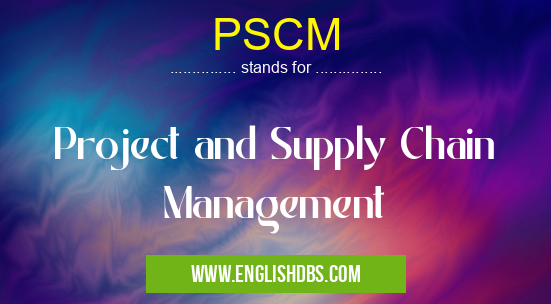What does PSCM mean in MANAGEMENT
Project and Supply Chain Management (PSCM) are a critical function within many organizations, that is often overlooked or misunderstood. PSCM combines the management of projects and supply chains into one unified system, enabling organizations to operate more efficiently, reduce costs, and increase customer satisfaction. In this article, we'll go over what PSCM is and its importance to businesses today.

PSCM meaning in Management in Business
PSCM mostly used in an acronym Management in Category Business that means Project and Supply Chain Management
Shorthand: PSCM,
Full Form: Project and Supply Chain Management
For more information of "Project and Supply Chain Management", see the section below.
» Business » Management
Definition
Simply put, PSCM stands for Project and Supply Chain Management. It involves managing the complete cycle of activities related to the successful execution of projects and supply chain operations in an organization. This includes project planning, execution, evaluation & control – as well as supply chain activities such as procurement, storage & distribution of resources.
Benefits
Projects executed with a PSCM approach can benefit from improved communication between stakeholders involved in the project; increased visibility of resources & tasks; reduced risks associated with mismanagement; improved organizational efficiency & cost-savings; as well as greater responsiveness to customer needs & demands by ensuring timely delivery of quality products/services.
Furthermore, supply chain processes facilitated by PSCM help create smoother collaboration between suppliers & customers with increased coordination in order management & delivery scheduling. This ultimately leads to an increase in trust amongst business partners while reducing chances for conflict due to unwanted surprises or misunderstandings.
Essential Questions and Answers on Project and Supply Chain Management in "BUSINESS»MANAGEMENT"
What is Project and Supply Chain Management?
Project and Supply Chain Management is the planning, design, and operational functions of the supply chain process to ensure that a product or service is delivered with desired quality on time. It includes integrated processes for cost reduction, improving customer service, eliminating resource waste, maximizing product/service value, and creating innovative approaches to business operations.
What are the components of Project and Supply Chain Management?
The components of Project and Supply Chain Management include procurement management, inventory management, physical distribution management, warehousing logistics management, supply chain management/sourcing optimization, customer relationship management (CRM),and production scheduling.
How does Project and Supply Chain Management improve customer service?
By adopting an effective Project and Supply Chain Management strategy, businesses can improve customer service by providing timely delivery of high-quality goods or services at competitive prices. Having accurate data on current stock levels enables more efficient replenishment strategies so that customers get what they need when they need it.
How does Project and Supply Chain Management help reduce costs?
Effective Project and Supply Chain Management helps businesses optimize their inventory levels while minimizing costs associated with procuring materials. Improved forecasting capabilities help cut down on overstocking or understocking items that may result in losses due to spoilage or expensive rush orders. Streamlining processes also helps to reduce labor costs associated with ordering materials or managing supply chains.
What are the benefits of using project and supply chain software solutions?
Software solutions provide a number of benefits including improved accuracy in tracking inventory levels across multiple locations; up-to-date data collection for more accurate forecasting; greater control over tracking suppliers; automation to streamline processes; better visibility into the entire production life cycle; real-time reporting for better decision making; optimized delivery schedules to meet customer demands; easier tracking of returns and reverse logistics activities.
Final Words:
In conclusion, Project and Supply Chain Management (PSCM) is an important concept for companies looking to optimize their operations and maximize customer satisfaction. By utilizing a comprehensive approach to managing both projects and supply chain operations simultaneously companies can benefit from reduced costs associated with mistiming or mismanagement of resources, improved communication between stakeholders involved in the project or common goals among suppliers/customers, resulting in improved collaboration with stronger relationships overall.
